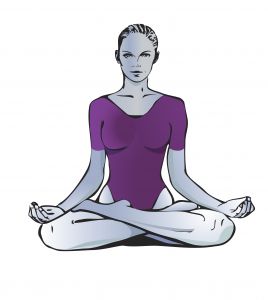
Virtually no one is a stranger to anxiety; unpleasant for sure, and for some of us, this unwelcome visitor can show up a bit more frequently and linger a lot longer. Failure to cope can cause serious problems in your personal and professional life, as well as damage your health. If you are hoping to supplement the effects of medications used to address this problem or simply want to tackle the problem through natural means, there are several ways to accomplish this.
Meditation
As someone who used to experience a lot of anxiety, I can say without doubt that meditation was the most powerful tool in helping me rein it in. The best way I can think to describe it is that meditation helps fix a broken mind, a mind with a skewed perspective that races and simply reacts to everything around it automatically. This ancient practice helps you gain control of your thoughts and helps strengthen the space that lies between your consciousness and your thoughts, which contrary to popular belief, are not you, just a fleeting entity. When you can sit back and observe what you are thinking and feeling, you can respond, rather than react. You can learn to sit with discomfort better without having as strong a reaction to it—essentially, you become more comfortable with being uncomfortable. You will quickly begin to realize the fleeting nature of your thoughts and feelings and when something comes up, you will have a stronger awareness that it will pass. You adopt a more empowering perspective that says you can control this.
Journaling
There is great power in writing things down, whether it is a to-do list, or a summation of the day’s experiences. I have found journaling to be another powerful tool in coping with anxiety because of the opportunity it represents for reflection. By writing down what you felt during the day, you can see what things trigger you, how you may be able to respond better and why you felt what you did. When we want to change ourselves and our ways, the first step is to perform a deep examination of what is going on inside—only then can we begin to transform. Another reason this tool is so useful is the privacy aspect. Only you are seeing this, so you do not have to censor yourself. Write down everything you felt or thought, no matter how crazy or embarrassing it may seem. No one will see it but you, so let loose.
Supplementation
A variety of supplements have been used for thousands of years to promote mental well-being, and it is well worth your time to experiment with this route, provided you do not have any medical conditions or are using any medications, that may interfere with a particular supplement. Some research suggests that passionflower may work as well as benzodiazepines (a common class of anti-anxiety medication) for treating the symptoms of anxiety. Traditional Chinese Medicine highly values angelica for its ability to soothe nervousness and insomnia. St. John’s Wort may also help, particularly if you suffer from bouts of mild to moderate depression—this herb in particular is known to interact with many types of drugs so if you take any sort of medication, it is doubly important to educate yourself on any possible interactions. Valerian may also help if your anxiety is keeping you from sleeping at night.
It is important to remember that it can take herbs and other natural supplements longer to work than pharmaceuticals. In some cases, you may not reap full benefit until you have been taking something for up to eight weeks. It is important to be patient when working with natural medicine. And just like drugs, not every treatment may work for every person, so keep trying until you find something that works for you.
Kelli Cooper is a freelance writer who is passionate about natural health, particularly the benefits of Chinese herbs; she recommends visiting Solstice Medicine Company for a great selection of quality Eastern remedies.
Photo Credit

